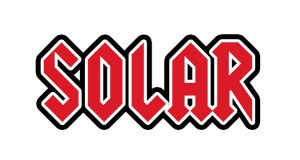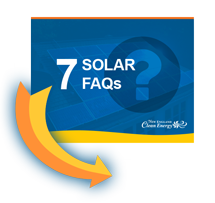For you AC/DC fans, this post is not about Malcolm and Angus Young. 🙂
Q. What do AC and DC stand for?
A. In the electricity world, “AC” means Alternating Current, which is the type of electricity transported on the utility grid and used in American homes and businesses. The current flows in both directions.
“DC” means Direct Current, which is the type of electricity made by solar panels and stored by batteries. The current flows in one direction.
Q. How is one converted into another?
A. In the case of solar, a piece of equipment called an inverter converts the DC power from the panels into AC power for use in your home or business. Inverters come in central inverter form and micro-inverter form.
Q. What’s the nameplate rating?
A. Nameplate simply means the official power production rating given to the equipment. It can be in AC or DC. The generator nameplate capacity of solar panels tends to be in DC, and the nameplate rating for inverters in AC.
Q. Is the wattage of my solar energy system measured in AC or DC?
A. Typically, the capacity of your solar energy system to produce electricity is described in DC, which is less confusing, because it’s based on straight math. The number of panels times the panel wattage equals your system’s DC capacity:
20 panels x 320 watts each = 6,400 watts DC
To convert your DC system capacity into AC, multiply the DC watts by the inverter’s efficiency. If the inverter runs at 95% efficiency, you get:
6,400 watts DC x 95% efficiency = 6,080 watts AC
Q. If I install battery storage with my solar, is that AC or DC?
A. It could be either. Battery storage systems come in two types.
DC-coupled batteries store DC power received directly from the solar panels. They can’t store AC power received from the grid.
AC-coupled systems are more flexible. They can store power produced by solar panels as long as that power has been converted by an inverter into AC. And, they can store AC power received from the grid.
Q. Does AC/DC have anything else to do with my solar?
A. Yes:
- It’s helpful to know that your system will probably never operate at its full DC capacity. My article on STC vs. PTC ratings of solar panels explains why.
- It’s also helpful to know that if the DC wattage of your system exceeds the inverter’s capacity, the inverter will limit slightly the amount of electricity going from your solar energy system into your property for use. My article on inverter clipping explains that in more detail.
- System size can determine which state solar programs you are eligible for. In Massachusetts, for example, residential systems larger than 10,000 watts AC do not get Net Metering. (In Rhode Island, Renewable Energy Growth payments are based on actual production or kilowatt-hours, not on system size or kilowatts.)
If you liked this article, you might also enjoy:



 Download our 7 FAQs
Download our 7 FAQs


2 Responses to “AC/DC in the Solar World”
Small correction, but the Massachusetts Net Metering size limit (for cap-exempt single-phase systems) is 10,000 W (or 10 kW), not 10,000 kW.
Oops, thanks for noting that. We have corrected!
The comments are closed.